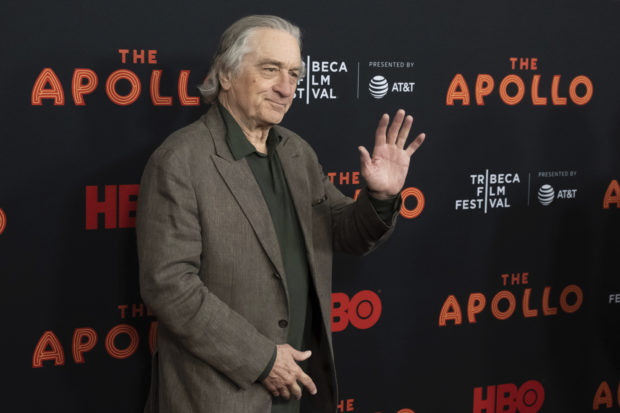18th Tribeca opens in Harlem with ‘The Apollo’

Robert De Niro attends the screening for “The Apollo” during the 2019 Tribeca Film Festival at the Apollo Theater on Wednesday, April 24, 2019, in New York. Image: Invision/Charles Sykes via AP
The 18th Tribeca Film Festival moved uptown on Wednesday for an opening night that honored an elder New York institution: the Apollo Theater.
Roger Ross Williams’ “The Apollo” premiered at the iconic Harlem music hall whose 85-year history is chronicled in Williams’ documentary. The movie and setting added up to a gala tribute to the 125th Street mecca of African American culture, where everyone from Ella Fitzgerald to James Brown to Chris Rock has come to forge their legacies.
“The story of black people in America is the story of the Apollo,” Williams said in an interview ahead of the premiere.
Tribeca isn’t the first New York film festival to uproot to the Apollo for a special event. Lincoln Center’s New York Film Festival came there last year to debut Barry Jenkins’ James Baldwin adaptation “If Beale Street Could Talk”.
But Tribeca, the festival founded by Robert De Niro and Jane Rosenthal, has made a habit of celebrating the city’s cultural institutions on opening night through documentaries about “Saturday Night Live” and the Metropolitan Museum of Art.
Article continues after this advertisement“In these disturbing times, when the administration is promoting divisiveness and racism, we’re making a statement by being here tonight that we reject it,” said De Niro, a well-known critic of President Donald Trump, introducing the film on the Apollo stage. “No, you don’t! Not in this house, not on this stage!”
Article continues after this advertisement“The Apollo”, which HBO will air in the fall, survey’s the theater’s expansive history but also its vibrant present. It follows the production of Ta-Nehisi Coates’ “Between the World and Me”, a production that Apollo president Jonelle Procope says perfectly reflects the theater’s mission for the future.
“We want to develop this new 21st century performing arts canon that focuses on telling the African American and African diaspora stories,” said Procope. “We are really the only performing arts organization in the country that is from a performing arts standpoint focused on the African American narrative. Our legacy is to create opportunities for emerging talent and nurture their talent and let them push the envelope.”
Opened in 1914 as a burlesque theater, the Apollo began catering to the black community in the 1930s. Its famed Amateur Night, begun in 1934, has been the first introduction of countless stars, including Fitzgerald, Stevie Wonder (introduced as a 12-year-old “genius”) and the Supremes.
Amateur night remains the signature Apollo show: a crucible through which endless performers have had to pass to confirm their talent. Anyone lacking will hear it from the audience. In Williams’ film, Dave Chappelle is seen saying his Apollo experience was the best thing that ever happened to him. “After that, I was fearless,” says Chappelle.
“I grew up in the black church and there’s a very similar dialogue that happens, the call and the response,” said Williams. “The Apollo, in a sense, is church. It’s a sacred space and a gathering of community in Harlem.”
The Apollo’s history can be staggering. Through its doors have come Duke Ellington, Sam Cooke, Ray Charles, Aretha Franklin, Otis Redding, Smokey Robinson and Richard Pryor. James Brown recorded one of the most revered live albums at the Apollo.
“When we first watched the film, I had this gut-wrenching emotional reaction. I was just crying like a baby,” said Williams. “The journey that black people have taken in America is a painful and difficult journey and our music is one of the tools we use to talk about that pain, to talk about that oppression, to escape from that pain. Our musical journey is a powerful one.”
With such an overwhelming legacy, the Apollo has striven to be more than a museum. After falling on hard times in the 1970s, it was named a state and city landmark in 1983. It was purchased by New York State in 1991 and turned into a nonprofit theater. Its long-running variety show “Showtime at the Apollo” was most recently rebooted on Fox last year.
Now, for the first time in its history, it’s plotting an expansion. The Apollo Performing Arts Center plans to in the fall of 2020 open two adjacent theaters, two doors down from the Apollo. One will seat 99, the other 199 — much smaller spaces than the 1,506 capacity Apollo.
Procope said the new theaters will allow the Apollo to program more expansively, add master artist residencies, host more speaking series, delve deeper into dance and create new streaming and podcasting possibilities.
“I think people understand where we’ve been,” said Procope. Soon, she says, they will see where the Apollo is going. CC
RELATED STORIES:
‘Patay Na Si Hesus’ to be screened in Canada anew
Docu on Laude killing screens in Tribeca and Canadian film fests